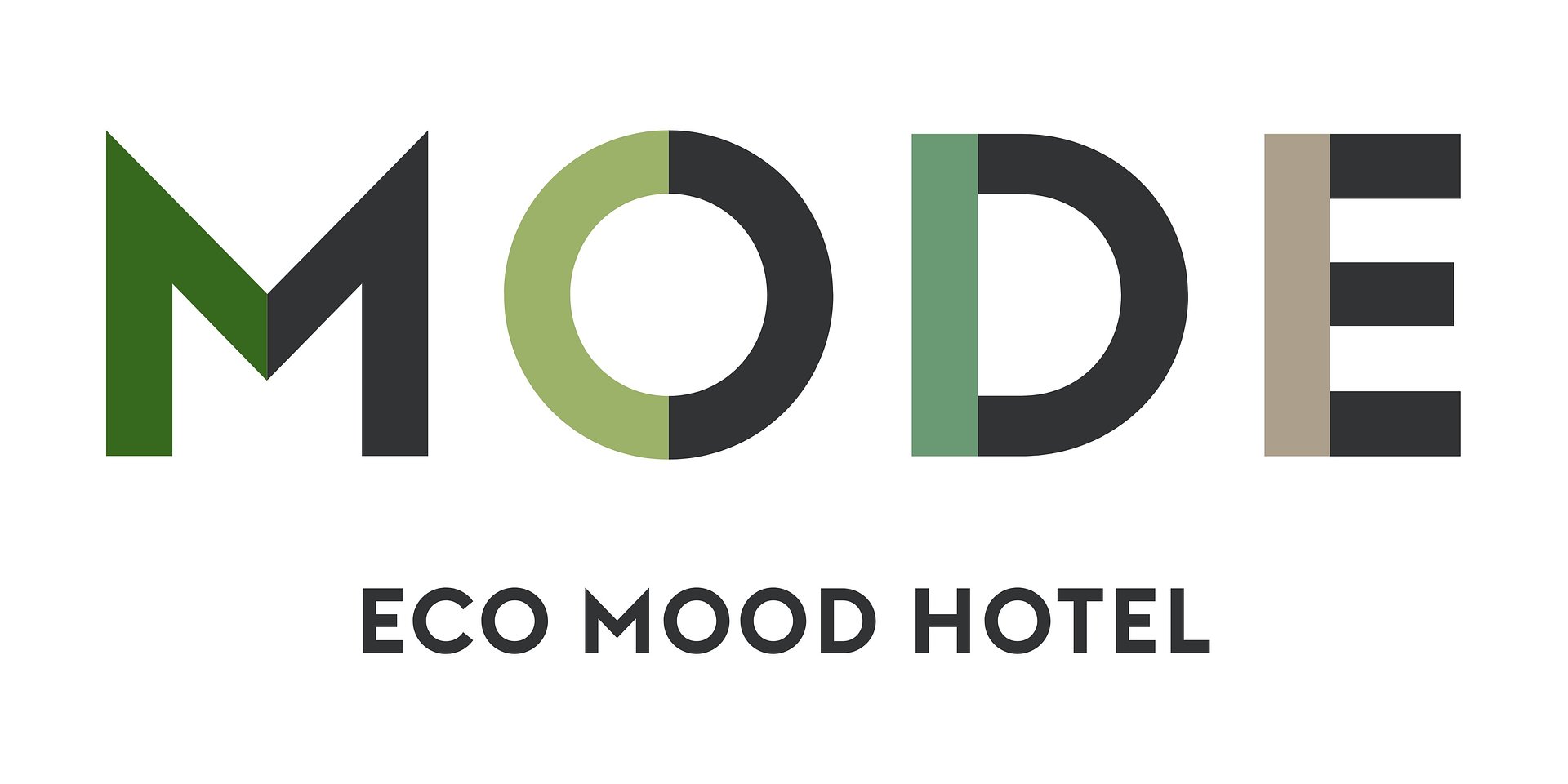An example of hospitality designed according to sustainable principles.
Known primarily as a sun & beach destination, Rimini stands out in the market not only for its seaside and inland leisure tourism offer, but also for its business appeal, thanks to internationally renowned events and exhibitions. Rimini is an iconic city and destination committed to evolving itself..
“Awareness. This is the key word for today's and tomorrow's tourism, understood as an increased consciousness of sustainable travel both in choosing accommodations that align with sustainability principles and in people’s purchasing behaviors that favor low environmental impact products and solutions”, says Mauro Santinato, President of Teamwork Hospitality and creator of the MODE HOTEL project. “MODE HOTEL is a response to this need and aims to be a hub of innovation both in terms of eco-sustainable design and hotel management.”
The structure of MODE HOTEL is a permanent showroom: each room offers a unique experience, reflecting the personal vision of eco-sustainable hospitality of each designer. MODE HOTEL breaks away from traditional hotel definitions, embracing a philosophy of doing things differently.
THE MODE HOTEL KEYWORDS
- Experimentation: Explore new trends in hospitality within a real-life testing ground
- Involvement: Bring together diverse players and perspectives to inspire fresh ideas and creative input
- Uniqueness: Create a one-of-a-kind hospitality concept unlike any other.
- Lab: Develop a space that serves as an experimental hub for sustainable hospitality
- Innovation: Showcase a gallery of innovative, eco-sustainable products and services
- Technology: Implement sustainable technologies that enhance both hotel management and guest experience
- Management: Establish a model for sustainable hotel management
- Inspiration: Create a space that would be a source of inspiration for those who want to rethink and innovate in sustainable hospitality sector.
- Welcome: Host guests seeking a unique, ethical experience, searching for something truly different.
THE MODE HOTEL PROJECTS
EXTERIORS AND COMMON AREAS
Reuse and renovation of an existing building, with no land consumption
Use of ceramic materials (a local product from Emilia-Romagna)
Low-maintenance greenery on terraces
Thermal insulation (in line with the DNSH principle – Do No Significant Harm)
Installation of photovoltaic panels
Use of low-consumption LED lighting
Downward-oriented lighting to prevent light pollution
Economic sustainability
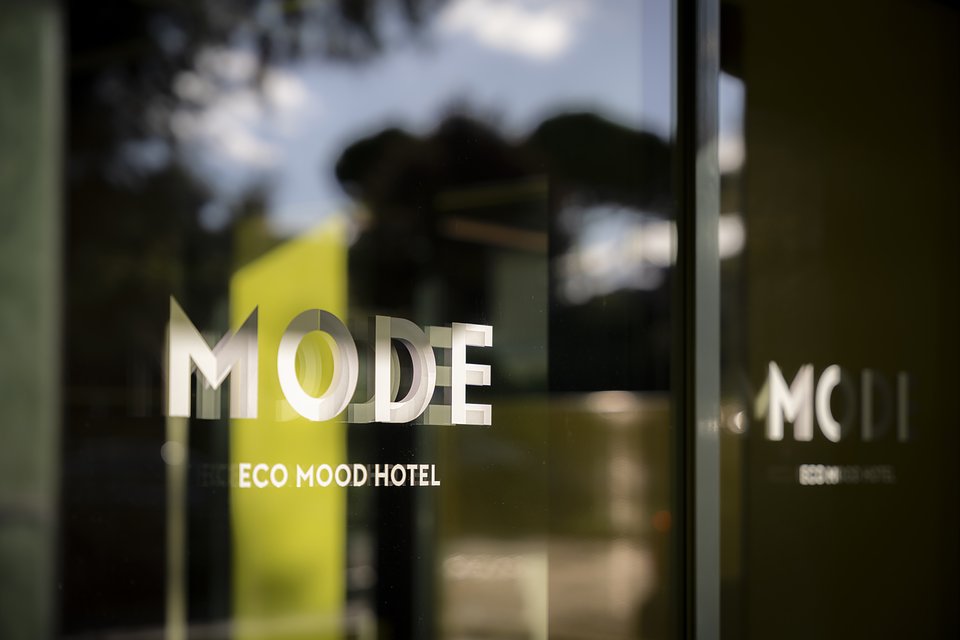
MODE HOTEL_Green is the new black
The project was carried out in full compliance with industry recommendations, ensuring conformity with all safety, energy efficiency, and light quality requirements.
Particular attention was given to the aesthetic integration of lighting elements with the architectural concept, selecting solutions that enhance the spaces and highlight their features without compromising functionality.
Special importance was placed on the management and maintenance of the system, choosing equipment and technologies that facilitate quick interventions and reduce operating costs over time.
The project emphasizes environmental sustainability principles by adopting low-energy consumption solutions, reducing light pollution, and using materials and technologies that contribute to minimizing overall environmental impact.
The combination of regulatory compliance, aesthetic coherence, operational efficiency, and environmental sustainability guarantees a cutting-edge lighting design capable of enhancing spaces while respecting the environment.
Compliance with relevant industry standards and regulations.
Selection of light sources that adhere to recommendations for reducing light pollution and saving energy.
Use of integrated control systems with luminaires designed to manage power, luminous flux, and energy consumption based on actual lighting needs.
Choice of lighting elements that aesthetically align with the architectural concept and possess technical and photometric characteristics suitable for the lighting design.
Design approach following the criteria established by the UNI EN 12464-2 standard, with particular attention to maintained average illuminance, uniformity, and glare control.
Lighting strategies aimed at optimizing visual comfort and psycho-physical well-being in both indoor and outdoor spaces, developed in accordance with environmental sustainability principles and biodiversity protection, with special focus on local fauna and flora.
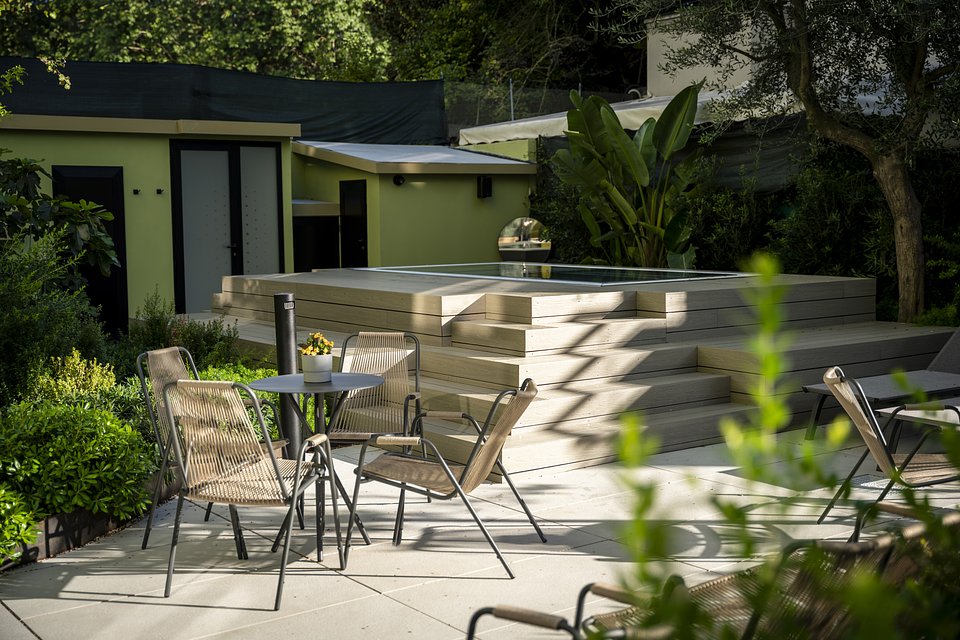
MODE HOTEL_Green is the new black
The sustainable principles of Stay cosy in una second life.
Use of ceramic (local product)
Ceramic mosaic made from production scraps
Wainscoting panels made from 100% recycled wood chipboard
Use of biogeometric designs (promoting personal well-being)
Use of sound-absorbing materials made from 100% recycled plastic felt (promoting personal well-being)
Incorporation of tillandsia “clouds” — green plants that feed on air humidity to purify indoor environments (promoting personal well-being)
Water-saving faucets and sanitary fixtures
Use of carpets made from recycled plastic recovered from ocean cleanup activities
Eco-friendly inks for printing wallpaper, wayfinding, and infographics
Wayfinding and infographics produced on cardboard substrates with ecological certifications
Floors made of 100% recyclable PVC, manufactured with a high percentage of recycled materials, free from VOCs (Volatile Organic Compounds)
Energy-saving LED lighting
Clay plaster for indoor humidity control
Decorative metal panels that are 100% recyclable
Products certified with EPD (Environmental Product Declaration) — a voluntary product certification that assesses the environmental impact of a product throughout its entire life cycle.
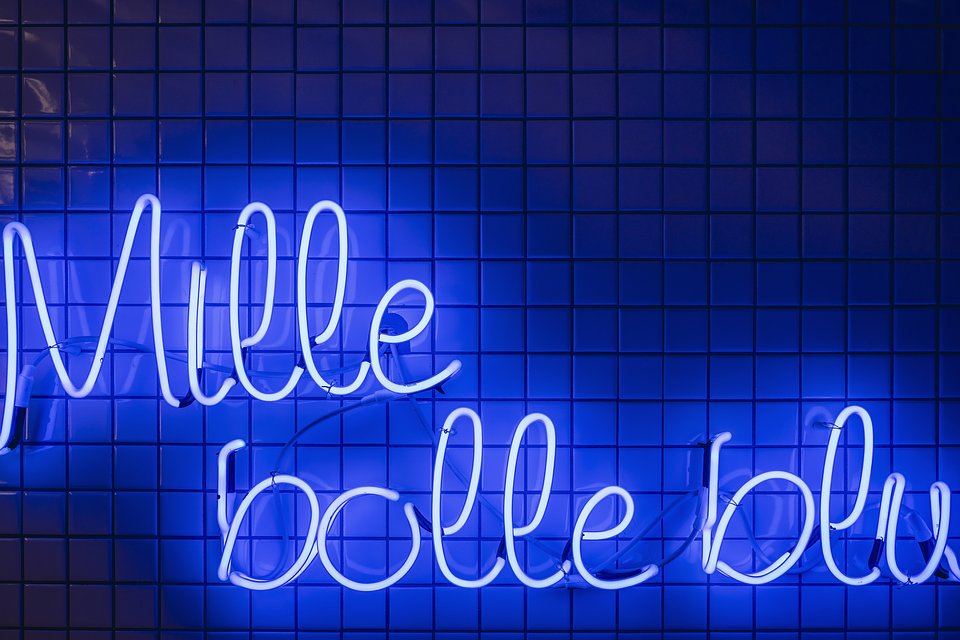
MODE HOTEL_Stai cosy in una second life_Mille bolle blu
It is a fusion of diverse experiences and complementary skills, brought together through the designers’ approach, merging visions, specializations, and different sensitivities into a shared and integrated design process. Since the whole is more than the sum of its parts, varied experiences enable the development of an adaptable and functional design method. It is a synthesis between the client’s needs and a distinctive design language that is constantly evolving.
The concept draws inspiration from two distinct yet fascinating worlds: on one side, the vitality of the Earth goddess; on the other, the timeless, enchanted atmosphere of “Alice in Wonderland”.
“Our goal is to strike a balance between these two seemingly distant worlds. Our representation of a pristine environment moves away from traditional green tones, instead embracing a more organic and fluid color palette, with a particular focus on the original source of life: water”.
The common areas of this hotel are transformed into a sustainable co-working environment, where the perfection of the golden ratio and natural balance guide every aspect of the design creating a welcoming and harmonious atmosphere that fosters creativity and collaboration.
The sustainable principles of GEA.
Design focused on minimizing material waste during construction and installation phases
Use of materials produced sustainably and in a climate-neutral way, embracing principles of the circular economy
Linoleum flooring as an eco-friendly solution, made from 98% natural and renewable raw materials, produced entirely with green energy, and suitable for multiple reuse cycles.
Use of recycled, low-impact laminated panels.
Enhancement of natural light through functional space orientation, combined with a low-consumption LED lighting system.
Selection of vertical wall coverings aimed at using materials that not only reduce landfill waste but also help decrease the demand for virgin raw materials, thus lowering the overall environmental impact.
Modular design, with furnishings conceived to ensure usage flexibility and functional optimization, aligned with principles of adaptability and durability—both in terms of construction quality and aesthetics.
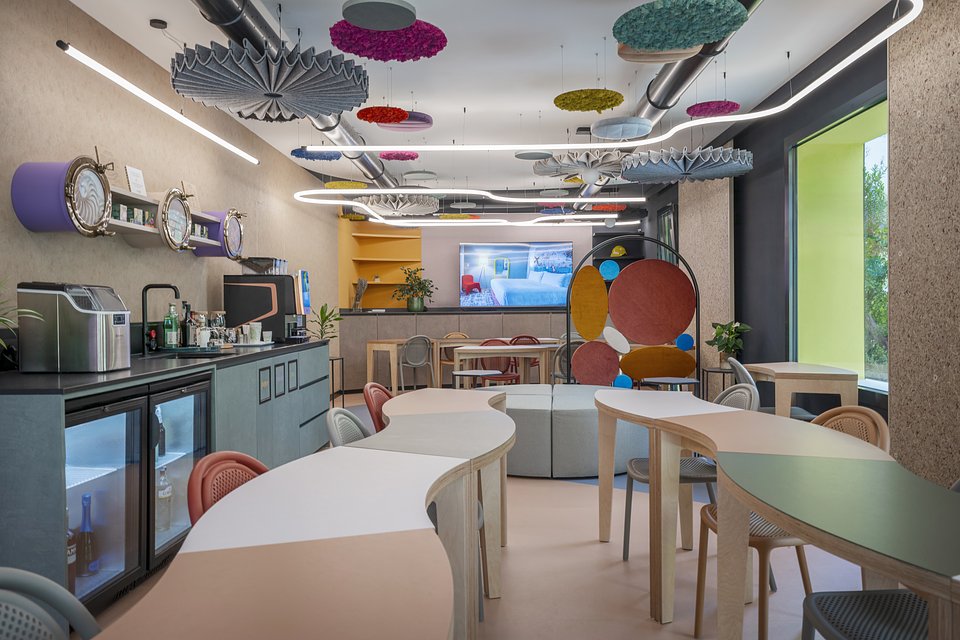
MODE HOTEL_GEA – nel mondo delle Meraviglie
THE SUITES
On the ground floor, the Garden Suite, designed by ROBERTA STUDIO, welcomes guests into a space conceived to offer a wellness-focused experience, with special care for the planet. This is made possible through collaborations with B Corp-certified companies and a vision that places sustainability at its core. Designed according to the principles of biophilic design, the suite incorporates organic shapes drawn from nature, a color palette inspired by a seaside city, and eco-friendly, natural materials, enhanced by a touch of vibrant, living greenery in every room.
“As designers and architects, it is essential that we propose solutions where interior and exterior environments interact and influence one another to create spaces that merge design, nature, and sustainability, and promote well-being for those who inhabit them.”
The sustainable principles of Garden Suite
Circular economy
Local supply chain and Made in Italy
Sustainable design
Technological innovation
Environmental certifications
Natural, recyclable, and bio-based materials
Human well-being and accessibility
Education and social responsibility
Use of living greenery
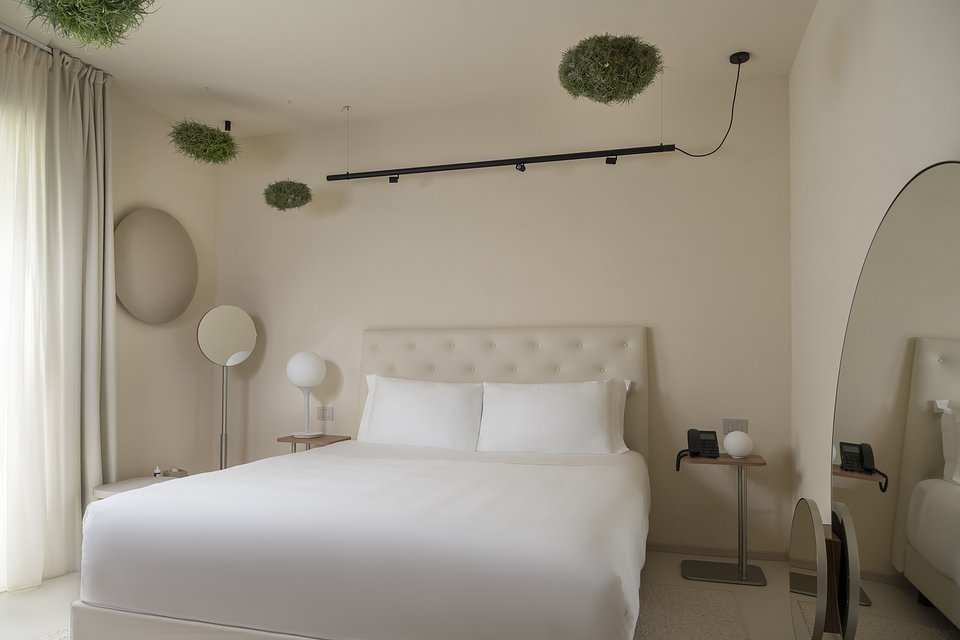
MODE HOTEL_Garden Suite
The Estate Italiana Suite tells the story of the carefree spirit of summer holidays on the Riviera—an up-to-date tribute to the unique hospitality of Rimini, with a clear reference to the vintage postcards once sent from vacations, echoed in the design of the bed’s headboard. “With this project, we want to place the human being at the center, focusing on social sustainability. It’s about respecting production processes, valuing craftsmanship and the time artisans devote to their work ultimately, the quality of life of those who create the objects we use”.
The sustainable principles of Estate Italiana
Local production: partnerships with local manufacturers to enhance the value of the territory and reduce indirect costs (transport and trave).
Use of recycled and recyclable materials, with a monitored and controlled supply chain.
Production in companies that guarantee social sustainability: employing properly trained and fairly contracted staff.
The suite features a fluid and flexible layout to minimize future transformation costs.
Use of a short supply chain to maximize the value of the final product
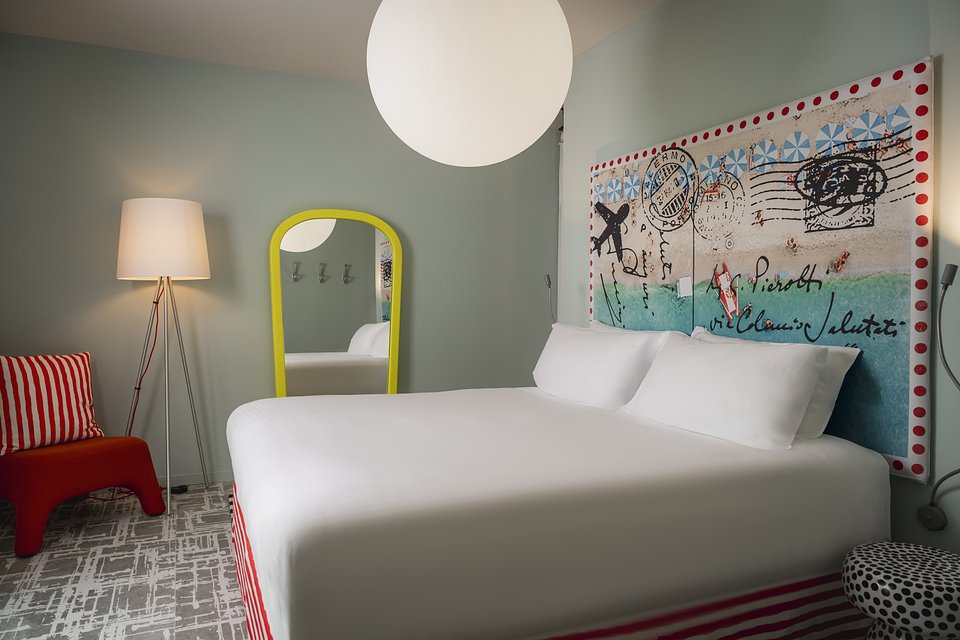
MODE HOTEL_Estate Italiana
In the living area, bedroom, and bathroom, everything evokes the warm and embracing atmosphere of Havana: from the materials used in furniture and accessories, to the repurposed vintage objects, geometric textures, and bold, bright colors. All of this is seamlessly integrated with the carefree and cheerful spirit of the Romagna Riviera, framed within a contemporary design approach.
A creative suite, mindful of sustainability in its choices, aligned with the reuse philosophy that is intrinsic to Cuban culture, and emblematic of a sustainable “Second Hand” approach.
(The original concept was developed during a workshop at the School of Design of the Politecnico di Milano by students Elisa Cattaneo, Benedetta Franci, Rolando Antonio Escobar Hidalgo, Elisa Panizza, and Erika Spanu, under the guidance and coordination of professors Cinzia Pagni, Elena Elgani, Francesco Scullica, and teaching assistant Federico Salmaso. The project was later further developed by the Department of Design at the Politecnico di Milano, with Francesco Scullica as the research project lead, and with the involvement of Claudia Borgonovo, Elena Elgani, Cinzia Pagni, and Federico Salmaso).
The sustainable principles of FROM RIMINI TO HABANA
Respect for the four dimensions of sustainability (environmental, social, economic, and cultural).
Design that anticipates potential functional changes and spatial evolution.
Shared design process and social responsibility: involvement of young designers and creatives from Italy and Cuba, as well as apprentice upholsterers, in all phases of the project—from concept to execution.
Furnishings that reduce resource consumption and waste: water-saving taps and sanitary fixtures; energy-efficient LED lighting.
Certified Made in Italy materials and finishes, specifically:
_Ceramics from local companies with EPD (Environmental Product Declaration) certification
_High-performance, washable wallpaper for greater durability.
_Wall paneling made from 100% recycled chipboard wood.
_Non-toxic, washable paints free of formaldehyde and added plasticizers, classified A+ for indoor air quality due to extremely low VOC (volatile organic compound) emissions.
_Fabrics made from natural fibers, certified with Ecolabel, EPD, Greenguard, or compliant with the EU REACH regulation.
Selection of second-hand furniture and accessories regenerated and reused.
Design and selection of new furnishings created according to eco-design principles to reduce environmental impact: robust and durable products, designed for multiple assembly/disassembly cycles, made with 100% recyclable materials (wood, metal, ceramic), non-toxic finishes, and a local supplier chain.
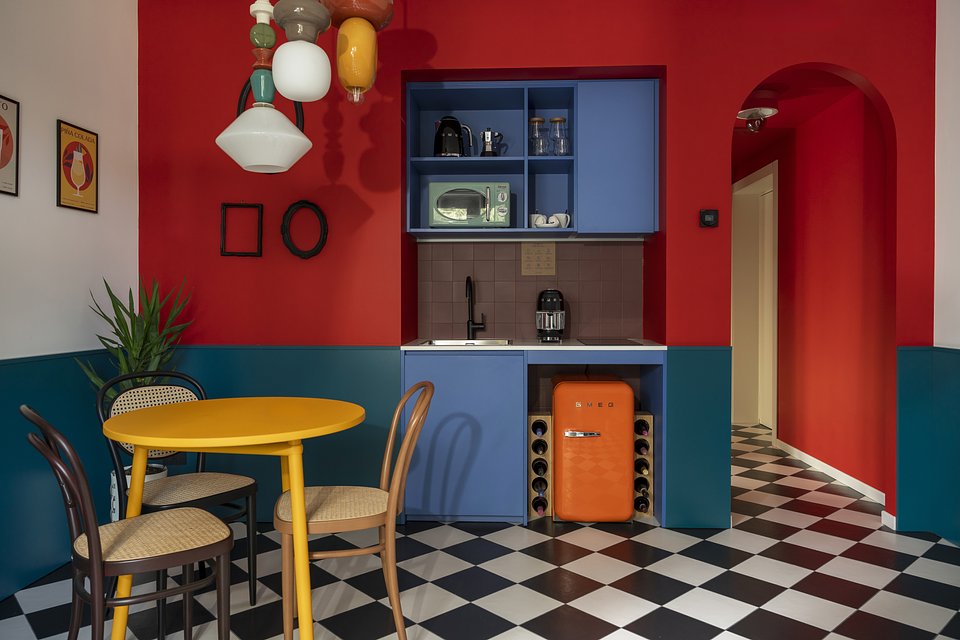
MODE HOTEL_𝗙𝗿𝗼𝗺 𝗥𝗶𝗺𝗶𝗻𝗶 𝘁𝗼 𝗛𝗮b𝗮𝗻𝗮
Onirica is a visionary project, yet grounded in the concreteness of design choices and a material board guided by a broad and conscious concept of sustainability. Every detail has been carefully considered to minimize environmental impact without compromising the elegance and functionality of the space. In this balance, the language of hospitality meets that of luxury in a surprising interpretation, one that seamlessly blends refinement and responsibility.
The sustainable principles of Onirica
Sustainable materials: use of durable materials free from harmful substances, with FSC or EPD certifications to ensure responsible sourcing and low environmental impact.
Responsible suppliers: selection of companies with clear ESG policies and ethical practices, committed to waste reduction and responsible management of the production cycle.
Local production: preference for local suppliers and manufacturers to reduce transportation, lower CO₂ emissions, and support the local economy.
Well-being and comfort: space design based on natural light, calming colors, and tactile materials to enhance physical and mental well-being and promote sensory comfort.
Sensory design: careful attention to the overall perception of the space through selected scents, textures, and details that stimulate relaxation and well-being.
Efficient lighting: use of low-energy LED lighting, selected for visual comfort and to harmoniously adapt to different areas of the suite.
Water-saving solutions: installation of taps, showers, and sanitary ware designed to reduce water consumption without compromising on functionality or comfort.
Eco-compatible installation: flooring and wall coverings installed without chemical adhesives to enable easier recycling and reduce harmful emissions.
Recycling and recovery: use of recycled fabrics and materials, including regenerated plastic and ocean-derived materials, transformed into new valuable resources.
Sustainable maintenance: selection of furniture and surfaces that are easy to clean and maintain, using eco-friendly products to reduce environmental impact over time.
Packaging and logistics: optimized, fully recyclable packaging and logistics solutions designed to minimize environmental impact.
Artworks: created using waste components from old printing machines, giving new life to materials otherwise destined for disposal.
Cultural appreciation: integration of local decorative and artistic elements that promote a connection to the region and encourage responsible tourism.
Communication and education: transparent communication of eco-friendly choices to guests, through aesthetically integrated QR codes and an educational approach that demonstrates how luxury and sustainability can coexist in harmony.
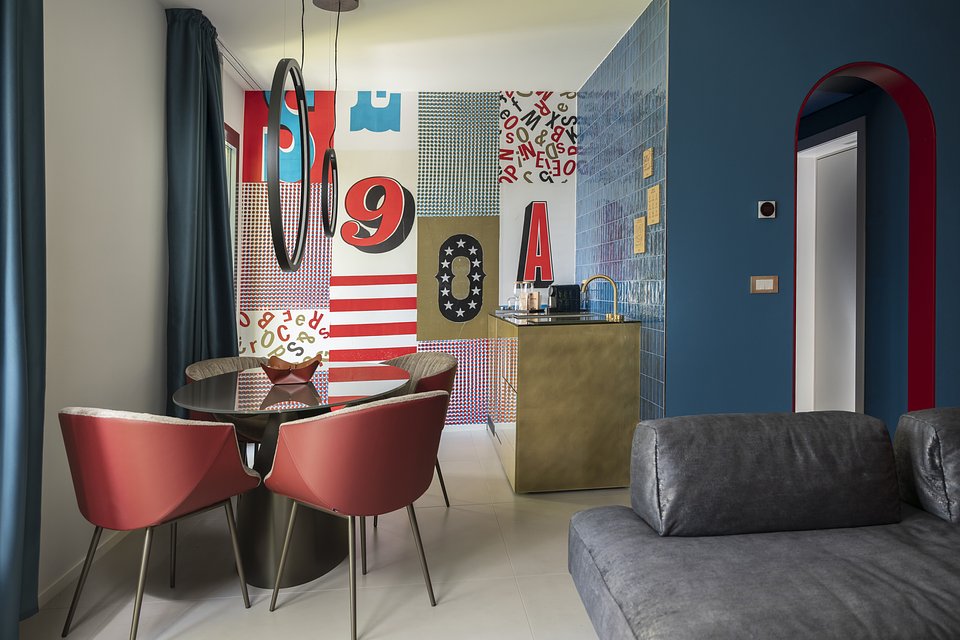
MODE HOTEL_Onirica
Greenside is both the “green side” and the “green inside”, a revolutionary vision of a sustainable suite. The key word is hybridization: spaces become fluid, with blurred boundaries. The design is hyper-minimalist and parametric, it mimics nature through algorithmic processes that generate organic, almost sculptural spaces. The suite ceases to be merely a container for living; it becomes a total architecture in which the physical space merges with furnishings, lighting, and the user experience. Flowing lines, sculpted with plasticity and inspired by natural forms, create a futuristic yet warm cocoon, an experiential environment where living, natural, and recycled materials are reinterpreted in a minimal green style, inspired by the most advanced biomimetic design.
The sustainable principles of Greenside.
Bio-inspired parametric design
Wall paneling made from 100% recycled wood chipboard
Furniture, decorative elements, and lighting fixtures 3D-printed from bio-polymers derived from food waste
Energy-saving LED lighting
Water-saving taps and sanitary fixtures
Certified natural wood parquet that purifies the air and acts as a physical barrier against the spread of viruses and bacteria
Panels made from stabilized natural lichens, antistatic and antibacterial, helping to regulate indoor humidity
Indoor fabrics made from recycled PET bottles
All products EPD-certified (Environmental Product Declaration)
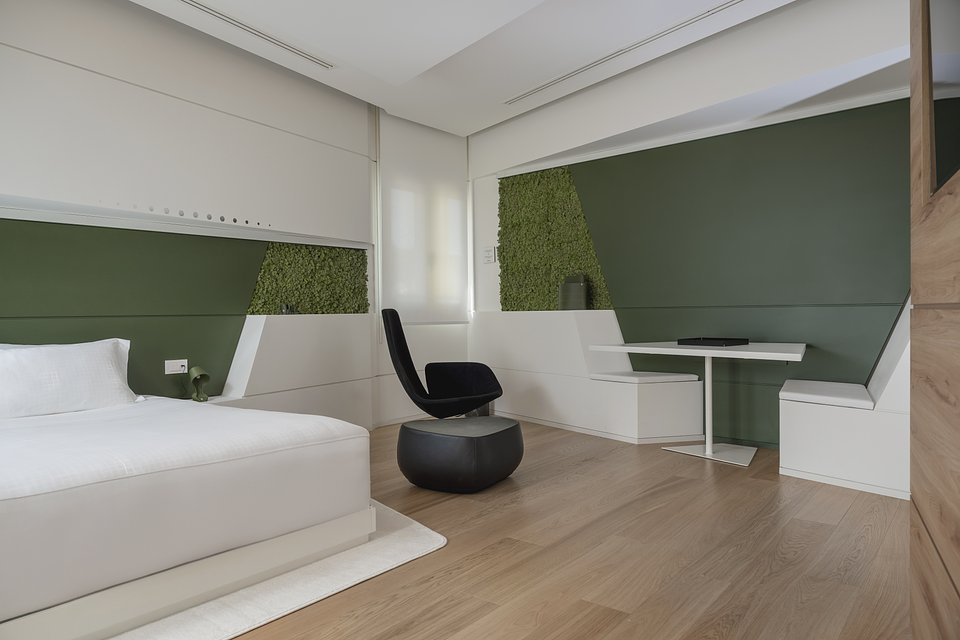
MODE HOTEL_Greenside
The goal is to merge sustainability with the Genius Loci, making the sea more livable today in order to return it in better condition to future generations. Aesthetically, the suite evokes the colors of the sea and features flowing, wave-like forms—from the floor graphics that recall ocean currents to the large, curved entrance wall enclosing the service area. The challenge lies in achieving a low environmental impact, proving that it is possible to envision and construct new forms of architecture while maintaining an approach ever closer to “zero carbon footprint”.
Mare 3.0 ecomes a tangible manifesto of a new and necessary circular economy, with a strong focus on water, an element now more fragile and in need of protection than ever before.
The sustainable principles of Mare 3.0
Circular economy
Sustainable design
Technological innovation
Environmental certifications
Natural, recyclable, and bio-based materials
Furniture upholstered with indoor fabric made from PET yarns sourced from recycled plastic bottles
Seating innovatively crafted from hemp and eelgrass (a type of seagrass)
Custom furniture made from 100% recycled and recyclable chipboard panels
Curtains made from indoor fabric using PET yarns sourced from recycled plastic bottles
Energy-efficient LED lighting
Water-saving taps and sanitary fixtures equipped with standard flow restrictors
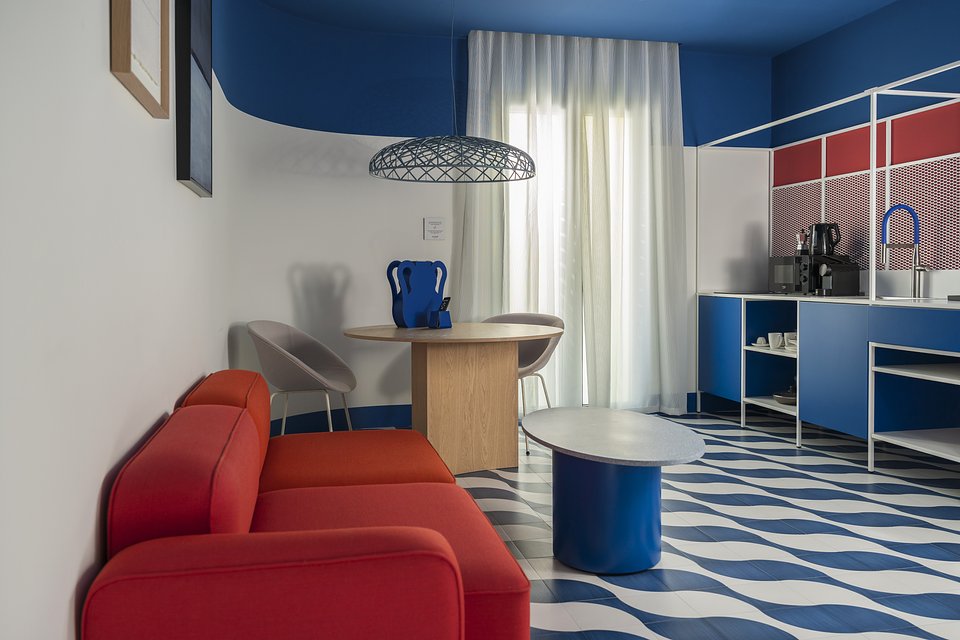
MODE HOTEL_Mare 3.0
ovre.design® has envisioned a suite where environmental sustainability meets human sustainability. Through conscious design that embraces eco-friendly processes and materials, this space embodies a deep care for both the planet and individual well-being.
Entering the Sensi Suite means disconnecting from the outside world and reconnecting with oneself. It’s an invitation to listen to the five senses, to rediscover a bond with nature, and to embrace the essence of materials. Every element is carefully selected, recycled or recyclable, nothing is left to chance. Everything contributes to a greater harmony.
The sustainable principles of suite Sensi
Metals sourced from processes powered by renewable energy
Laminates made with recycled chipboard and EPD (Environmental Product Declaration) certification
Marble from production waste and aggregates made with Portland cement, using only water and no additives
Water-based resin with VOC and EPD certifications 100% natural clay wall finishes, helping to regulate indoor humidity
Biophilic elements integrated into the room to foster an authentic connection with nature
Dedicated space for yoga and meditation, promoting human sustainability and regeneration
Water-saving taps and sanitary fixtures
Carpeting made from recycled plastic materials Energy-efficient LED lighting Concealed television to encourage disconnection and mindful presence
Partnerships with reliable, transparent, and aligned companies, committed to making work sustainable for all involved.
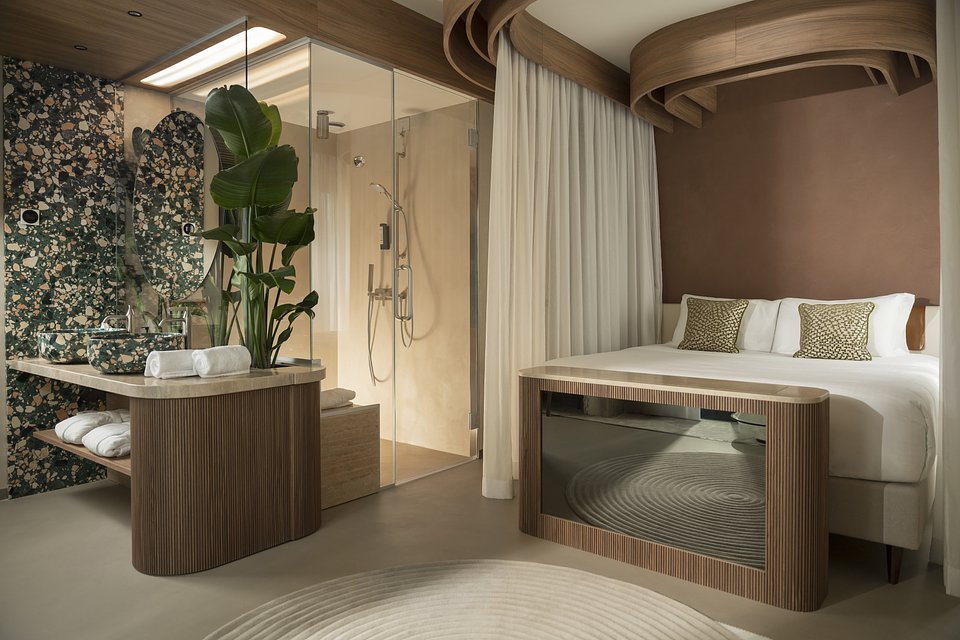
MODE HOTEL_Suite Sensi
A project of sustainable hospitality that centers on the idea of discreet luxury. With the Silenzio Sfrenato Suite, NOA interprets MODE's core value of environmental respect by working with only what is essential, removing anything considered superfluous in a hotel room that could create visual “noise” and distract from the true essence of design. The furnishings are high-quality, with a craftsmanship feel, and are designed for longevity. To make each stay a unique experience, NOA carefully selects a few signature pieces, bringing exclusive design to the forefront. “By playing with the adjective ‘sfrenato’ (which translates to ‘unrestrained’ and is often paired with ‘luxury’ in a baroque or excessive sense), we deliberately reverse its meaning in this room, while still delivering on the promise of high quality, and presenting a sophisticated, curated design experience for those who stay here.”
The sustainable principles of Silenzio Sfrenato
Minimizing waste in the hotel room by keeping furnishings to a minimum
Flexible space designed to embrace change
Crafted pieces made from precious, timeless materials
Energy-efficient LED lighting
Partnerships with reliable local companies that enhance the value of Made in Italy
Water-saving taps and fixtures
Wood flooring finished with water-based paint enhanced with recycled graphite
EPD-certified products (Environmental Product Declaration)
Locally sourced ceramics, with 100% of wastewater treated and reused
Marble washbasin made from recovered stone slabs
Radiators made from 100% recyclable materials
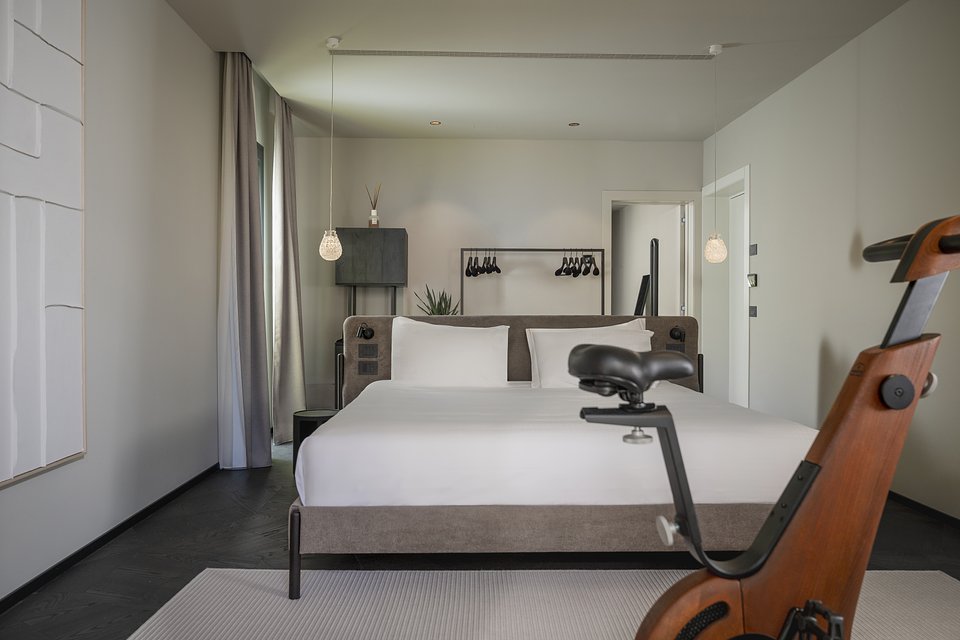
MODE HOTEL_Silenzio Sfrenato
The design is refined, balanced, and intentional, creating an authentic synergy through art, while giving new life to objects. It serves as a reminder that sustainability is a global responsibility, one that demands immediate action, no longer something we can postpone.
The sustainable principles of Mini’mor.
Phenol-free laminates
Products designed to be durable, easy to repair, disassemble, and recycle
Promoting material longevity through integrated artworks
Certified wood sourced from responsibly and sustainably managed forests, ensuring compliance with environmental, social, and economic standards
Surfaces resistant to liquid absorption and bacterial growth, making cleaning and maintenance easier
Wellness path that combines cedarwood elements with air purifiers
Energy-efficient LED lighting
Water-saving faucets and sanitary fixtures
Rugs made from natural fibers
Furniture made with 100% recycled eco-friendly panels
Fabrics made from recycled materials, including plastic bottles and textile remnants
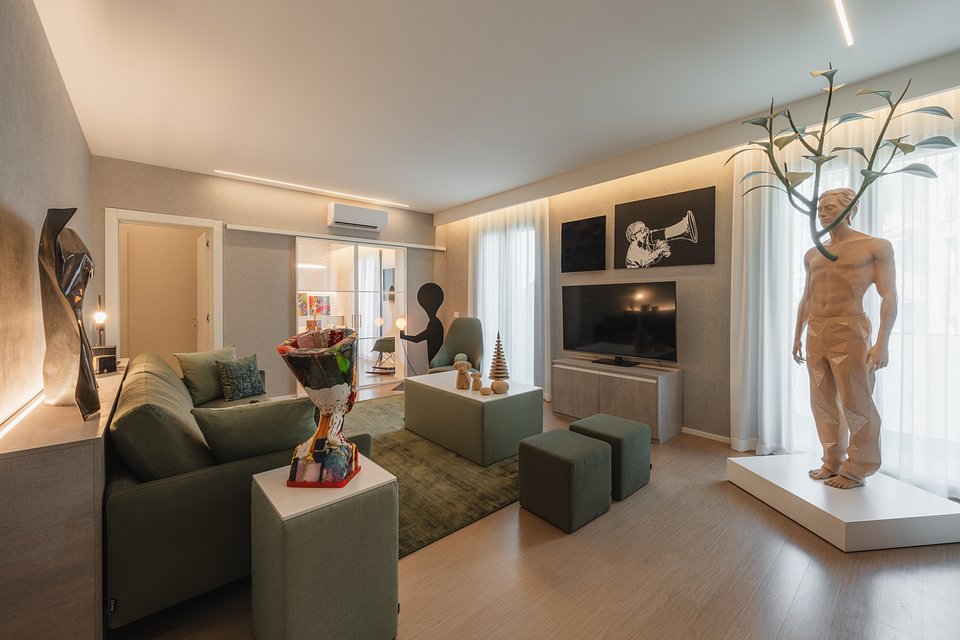
MODE HOTEL_Mini’mor
CREDITS
Project Management | Hospitality Project
Marketing Consultant |Teamwork Hospitality
Architectural coordination and artistic director | Laura Verdi
Corporate identity | Santacroce DDC
Ph. Credits | Flavio Ricci
TECHNICIANS
Facilities | Studio Cavazzoni Associati
Permits and site management | Studio ASP – Loris Rinaldi
Project and construction site coordination | Hospitality Project
LEED AP BD+C | Ingegnere Stefano Ferri

